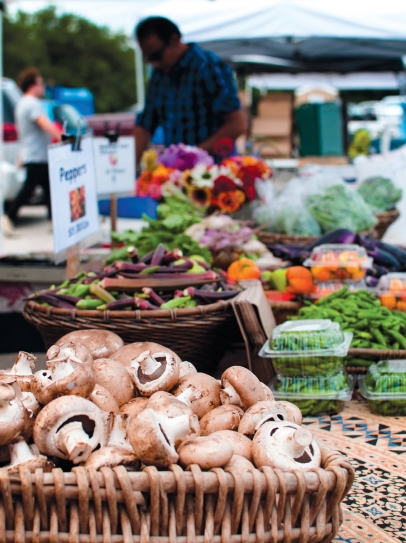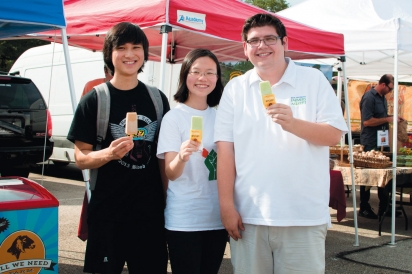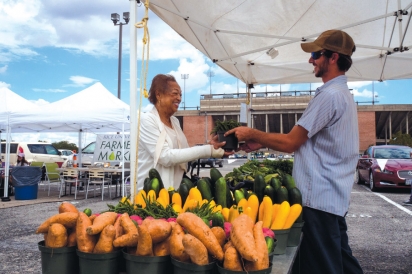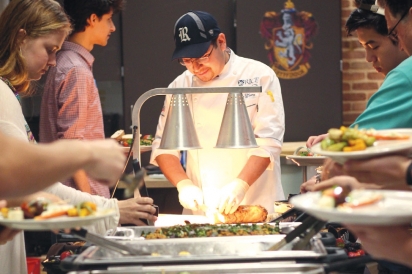The Farmers Market at Rice University
University Finds Many Lessons and Benefits in Food Upgrades
A farmers market exists for the food, of course, but it’s the people that make a market a great experience. Conscious consumers benefit both by knowing where their meal comes from and by getting it fresh off the farm. Producers benefit from meeting the people who eat their food, rewarded by their feedback and their smiles. No market is quite like any other, because each market community depends on its unique location; it’s a unique dynamic wherever you go.
The Rice Farmers Market brings consumers and producers together, but university involvement adds another layer, turning the market into a forum to test the very idea of how a food community can work. Everyone involved gets something special from that relationship.
As Rice University celebrated its centennial in 2012, President David W. Leebron laid out goals to carry Rice into its second century, including the cultivation of “spaces that create vibrancy within the community, not just the Rice community, but the community at large,” says Susann Glenn, manager of communications for housing and dining and Rice Farmers Market manager. The market not only helps work toward that goal, but also fits into the growing “foodie culture” on campus.
“Prior to the market, when I had students who wanted to do food-related projects, it was really hard,” says Richard Johnson, director of the Administrative Center for Sustainability and Energy Management and professor of environmental studies and sociology. But, he recalls, once Chef Cari Clark from Baker College (now retired) started seeking local food for her kitchen, “other chefs started doing it, too. And the change was like flipping a switch. …The market did, in my view, accelerate the trend.”
Now, across all the campus eateries, students and staff at Rice enjoy made-fromscratch food, a quarter of which comes from within 200 miles of the university, according to Glenn. It’s easier to get local food when farmers already converge on campus once a week for the market. The university kitchens in the serveries are self-operating, run by an executive chef and a staff of sous chefs: Chefs devise their own menus, source their own ingredients, and use their own recipes, which gives them the freedom to create dishes that utilize what’s in season, or to react to the students’ needs, like when Chef Ed Castillo at South Servery made chicken soup during a particularly vehement cold season. Chef Kyle Hardwick at Seibel Servery places a weekly order with Atkinson Farms and makes sure to encourage them to bring whatever they have a surplus of: “Just bring it, I’ll use it,” he tells them.
This arrangement gives farmers peace of mind, knowing that the university will happily purchase whatever they happen to have. Mike Palmer of Cellar Farms says “We’ll call Susann and say ‘We have 80 pounds of cucumbers’ and she’ll say, ‘We’ll take them!’… [Sometimes] she claims everything before we get here!”
This was especially important to the farmers after Hurricane Harvey, when their businesses all took a hit, either from direct damage to their farms or from markets closing due to area flooding. Worried that attendance would be low on the first market day after Harvey, Glenn bought every visitor a goat-milk popsicle from Stacey Roussel’s All We Need Farms, drawing out an unexpectedly large crowd of customers. The market’s generosity means a lot to Roussel: “It helps because we’re a small farm and we have goats that give milk every day, whether there’s a hurricane or not. We only have so much capacity to store milk and to store popsicles, so when it backs up and when the demand stops so abruptly like that, it can be really scary.”
The university location provides a boost for the vendors in good times, too, because their products are used across campus, increasing their visibility. “They use our products at the university to showcase it to the students, and get the students over here,” says Fernando Guirola of Macaw Confections. And he loves that this benefits not only the farmers, but also the students: They “learn more about healthy food and the right foods to eat.”
Students get more than just delicious food from the market, too: They help manage and advertise it, visit the vendors’ farms and engage with the community outside their campus. A regular visitor to the market, Andrew Huang, junior majoring in kinesiology, feels that the market enhances his collegiate experience: “We get exposure to new ingredients.
Rice students think it’s a big deal to keep their impact on the environment small. Ensconced in a campus culture that encourages student governance and with access to self-operating kitchens acting as real-life laboratories for food-related projects, Rice students have opportunities to put their ideas into practice. And they have lots of ideas.
“Students always love working on projects that have to do with food or where they live,” says Richard Johnson.
This semester, for Johnson’s class “Environmental Issues: Rice into the Future,” students selected a project to include more plant-based protein dishes on menus at campus serveries. Working with campus chefs to implement new dishes and spreading the word that plant-based proteins can be a tasty option with low environmental impact, students see the results of their work immediately—and at the same time, they encourage fellow students to embrace more variety in their diets, which can have long-term benefits for their health. So far, ‘it’s a pretty welcome change,” says Meagan Dwyer, recent Rice graduate and current communications assistant for housing and dining and the Rice Farmers Market.
Last November, Dwyer herself was heavily involved in lightening Rice’s food waste through a weeklong challenge amongst the colleges to see who could produce the least food waste in their serveries. She and the other student “Eco-Reps” educated their friends on how to only take the food they would actually eat and encouraged them to post pictures of clean plates on the competition Facebook page. The organizers weighed servery trash all week to see which college threw away the least. “It was really cool to see the people at my college get into it,” Dwyer remembers. Even better, the impact of the challenge has persisted, as serveries still no longer use trays, subtly encouraging diners to take less when they go through the buffet line. (They can always go back for more!)
With the Green Dorm Initiative promoting new sustainability competitions every year, students are continually motivated to keep the innovation coming. What small changes will have a big impact this year?
> Rice University Farmers Market runs weekly on Tuesdays, 3:30–6:30pm at location 5600 Greenbriar Dr., Houston







